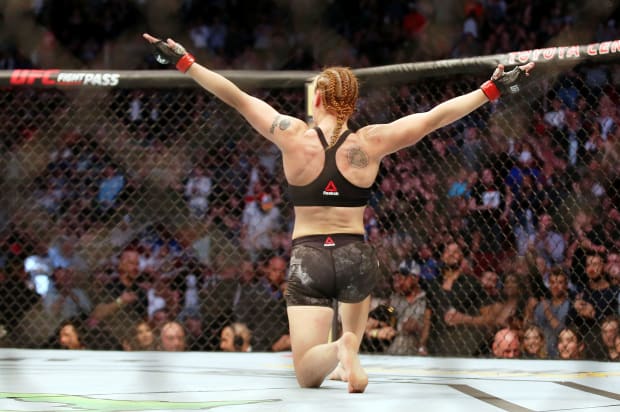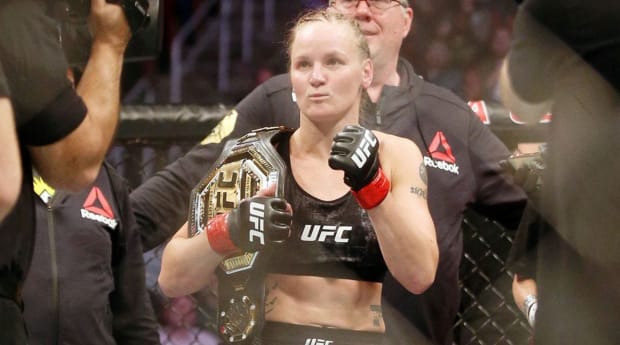UFC flyweight champ Valentina Shevchenko discusses her love for mixed martial arts, fighting philosophy and more ahead of UFC 255.
Editor's note: If you purchase something through one of our links, we may earn a commission.
It’s March 9, 2020. COVID-19 is beginning to rage. In a midtown Manhattan office building, workers are starting to pack boxes, order hand sanitizer online and prepare to work from home for the foreseeable future. An office monitor tuned to CBS shows a market in free fall, down more than 1,000 points.
This has the effect of overshadowing Valentina Shevchenko’s media tour through Manhattan. She was supposed to be on a well-deserved lap. The Kyrgyzstan-born Peruvian professional mixed martial artist—and we stress artist—is the UFC women’s flyweight champ, fresh off dominating Katlyn Chookagian to retain her belt. She is also fresh off kicking Halle Berry’s ass. But it’s hard to talk fighting with the world on the verge of tapping out.

This tableau is in keeping with the rhythms of Shevchenko’s UFC career. She is a dazzlingly talented and versatile fighter, a first-ballot Hall of Famer. But she lacks Ronda Rousey’s or Conor McGregor’s instincts for theater. She doesn’t have the unblemished record of Khabib. Or the clean-out-the-division dominance of Amanda Nunes. So she’s never quite gotten her due.
That could change this week. After an injury sidelined her for most of this year, Shevchenko is back at it Saturday at UFC 255 in Las Vegas, facing Jennifer Maia of Brazil.
It’s another chance for the world to get a look at her breadth of skills, her combination of brutal and slick. It’s also an opportunity for the world to get to know a worldly, thoughtful fighter, whose dedication to MMA is complete; but fighting is just a fraction of her overall makeup.
Below are some outtakes from a five-round conversation, conducted in English, Shevchenko’s fourth language.
Jon Wertheim: Do you have an overall philosophy for mixed martial arts?
Valentina Shevchenko: You know my philosophy of martial arts? First I ask: what is a fight? It is not the thing just to show who has stronger chin or who has stronger heart. It is easy. Anyone can do it. But martial arts? You have to dominate your opponent. This is the art.
JW: So you are not afraid of a war?
VS: Not at all. When you know it is from the beginning to end, how it can be, you are not afraid of nothing.
JW: What was your last war?
VS: Maybe not a [specific] fight but I would say when I didn’t have that kind of experience, probably when I didn’t have enough technique. But I didn’t have enough tactics. *That * makes for a war, a struggle…I spend all of my time in the gym to have all of this arsenal; because if you have only one thing you feel you are not able to perform your game as you wish. [Some fighters] have only one choice: go up front and just fight, fight, fight. But when you have good boxing, good legs, Taekwondo, Muay Thai, good clinching, you can choose. You can choose whatever tactic you want to use against your opponent.
JW: How did get into this line of work?
VS: My family. My mom put me and my sister Antonina—she is a UFC fighter, she is all time world champion Muay Thai K1—my mom she put us to the gym I started to train when I was five years old.
JW: And there’s no women’s UFC at this time.
VS: You know, there was not any female under UFC, there was not at all. But at the time there were girls competing in MMA. For example, my first professional MMA fight was in 2002 in Kyrgyzstan. In 2003 I won world championship in South Korea in MMA. And in 2005 I won another one.
JW: Do you remember what you were paid?
VS: [Laughs.] You know the time when I started my professional career it was not about money. It was not about the purse. It was about your experience. You wanted to fight. You wanted to show yourself. And I know fighters they were selling their flats, their houses, just to travel to the world championships. So it was not about getting paid, it was about idea of being martial artist.

JW: You are not one of these fighters who has a hard weight cut.
VS: No not at all. My philosophy of the good fighter: in advance is a training camp you have to lower your weight to feel good. For example, my weight is 135. With the fight camp, the training camp, I go down to 130. When I have one day before the weigh-in, it is another five. I think it is much better that way because you actually know what your real power is.
JW: How are you on fight day?
VS: I would say actually that fight day is more calm for me than the other days because all the nerves are coming from preparation. You are thinking about your opponent, you are studying her, you are thinking about her technique, her tactics. Training is not easy, it is very difficult. Fight day is the easiest part. You are in the changing room. You are in the venue. You are just free to think about things. You are just doing your job. You are just performing yourself. When I walk into the fights, walk through the crowd, it is a feeling of finally.
JW: You use the word “philosophy” a lot I notice.
VS: I would say martial arts is my philosophy. It is not only my philosophy or just the way that I gain money, it is my lifestyle. It is my religion. It is everything for me. It’s all about respect to everything. Respect to your opponent. Respect to life itself. About enjoying life experiencing life.
JW: Where did you learn to dance?
VS: It is another story. My mom said every time she didn’t want [my sister and me] to lose our femininity. So we have to do both things: martial arts and dance. It was something very natural for me that I learned, that I grew up with.